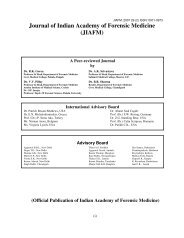Download - forensic medicine
Download - forensic medicine
Download - forensic medicine
You also want an ePaper? Increase the reach of your titles
YUMPU automatically turns print PDFs into web optimized ePapers that Google loves.
JIAFM, 2007 29 (4); ISSN: 0971-0973<br />
Editorial<br />
Role of Mandatory HIV Testing<br />
HIV testing carried out on a voluntary basis with appropriate pre and post-test counseling is considered to be a better strategy<br />
and is in line with WHO Guidelines on HIV testing. The basis and objectives of testing are to:<br />
• Monitor the trend of HIV infection in a population<br />
• Test blood or organs or tissue for ensuring safety of the recipients, and<br />
• Identify an individual with HIV infection for diagnosis or voluntary testing purposes.<br />
There is an active debate in the India on the issue as to whether there should be mandatory testing of persons suspecting of<br />
carrying HIV infection. Considerable thought has been given to this issue. Testing for HIV is more than a mere biological test for it<br />
involves ethical, human and legal dimensions. The Central Government feels there is no public health rationale for mandatory<br />
testing of a person for HIV/AIDS. On the other hand, such an approach could be counterproductive as it may scare a large<br />
number of suspected cases from getting detected and counseled to take appropriate measure to improve his quality of life and<br />
prevent spread of infection to other persons in the community. HIV testing carried out on voluntary basis with appropriate pre and<br />
post-test counseling is considered to be a better strategy and is in line with the national policy on HIV testing and also the WHO<br />
Guidelines.<br />
HIV testing should be a part of overall comprehensive preventive and promotive programme.<br />
Testing by itself does not result in behaivioural changes that restrict transmission of HIV to others and therefore, testing should<br />
be a part of total control programme which is conducive for behaivioural change of the individual by providing social support,<br />
means and skill to reduce or eliminated risk behaviour.<br />
Testing without explicit ‘consent’ of the patients i.e. mandatory testing has proved to be counterproductive in the long runs in the<br />
control of HIV epidemic. Social support and intervention must be directed to anybody vulnerable to risk behaviour irrespective of<br />
whether an individual or group participates in testing procedure or not. Otherwise such testing can drive the target people<br />
underground and make it more difficult for launching intervention.<br />
Any health programme which does not maintain the dignity of the patient of a patient or deprives him of his basic right to<br />
employment or access to medical care or social support is harmful on a long term basis.<br />
The question which must be asked before a testing procedure is undertaken is how this result will be used for the benefit of the<br />
individual or of the community; if there is a policy and means to support the group under testing following the test result; and does<br />
the test same principle of intervention apply even if people refuse testing?<br />
Positive answer to all the above questions is prerequisite for testing to be an effective tool.<br />
HIV testing procedure for research is designed according to specific objectives and could be decided by the researcher.<br />
However, all the studies undertaken must follow ethical standards which primarily involves full explicit consent of the patient and<br />
pre-decided and mutually agreed terms for any eventuality of the patient due to research activities.<br />
Government of India has already issued a comprehensive HIV testing policy and following issues are reiterated here:<br />
• No individual should be made to undergo a mandatory HIV testing<br />
• No mandatory HIV testing should be imposed as a precondition for employment for providing health care facilities<br />
during employment.<br />
• Adequate voluntary testing facilities with pre-testing and post testing counseling should be made available through out<br />
the country in phased manner. There should be at least one HIV testing centre in each district of the country for<br />
voluntary testing in the Government Sector.<br />
No citizen will be forced to undergo an HIV test; the Centre has told the Supreme Court putting an end to the debate on making<br />
such tests mandatory. The centre said in response to a court notice in a case where the Andhra Pradesh Government had<br />
denied promotion to an HIV- Positive Constable. The High Court had quashed the State’s decision. Aware of the effect of such a<br />
decision on lakhs of government officials, the apex court had sought response from the Centre to the question on “whether a<br />
person found HIV+ could be considered for appointment as sub-inspector of police in contravention of the recruitment rules”.<br />
The Union Health Ministry, in its affidavit, said it was aware of the active debate in the country on the issue of mandatory testing<br />
of people suspected of carrying HIV infection.<br />
Refusing to side with those canvassing for a mandatory test, the ministry said such an approach could be counter-productive as it<br />
may scare away a large number of suspected cases from getting detected and treated.<br />
The ministry said it was wrong to deny employment or promotion to anyone just because he had tested positive for HIV- positive<br />
persons should be guaranteed equal rights to education and employment as other members of the society”.<br />
HIV status of a person should be kept confidential and should not in any way affect his right to employment, position at<br />
workplace, marital relationship and other fundamental rights, the ministry said.<br />
The Centre’s National AIDS Prevention and Control Policy unequivocally said there should be no discrimination in matters of<br />
employment to an HIV positive person and that they should be guaranteed rights enjoyed by other members of society.<br />
The Constable had approached the Andhra Pradesh Administrative Tribunal, saying that though he cleared the written tests and<br />
was provisionally selected for the post of Sub-Inspector, he was denied the promotion only because he tested positive for HIV.<br />
The Tribunal had rejected his claim going strictly by the Andhra Pradesh Revised Police Manual, which prohibited entry of<br />
persons who are HIV- positive into government service. He appealed before the Andhra Pradesh High Court, which had allowed<br />
his claim.<br />
Mukesh Yadav<br />
vi


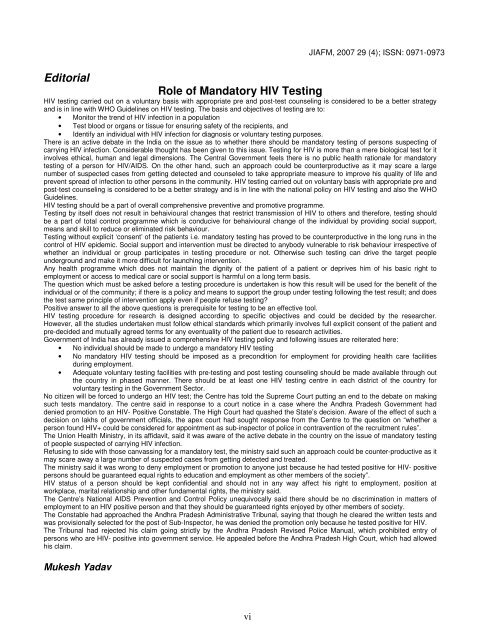
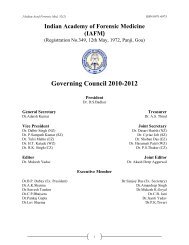
![syllabus in forensic medicine for m.b.b.s. students in india [pdf]](https://img.yumpu.com/48405011/1/190x245/syllabus-in-forensic-medicine-for-mbbs-students-in-india-pdf.jpg?quality=85)
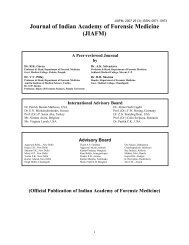
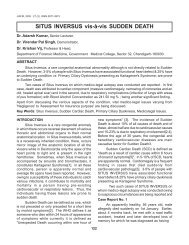
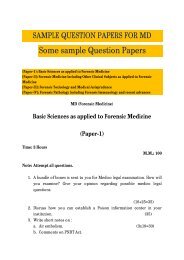
![SPOTTING IN FORENSIC MEDICINE [pdf]](https://img.yumpu.com/45856557/1/190x245/spotting-in-forensic-medicine-pdf.jpg?quality=85)
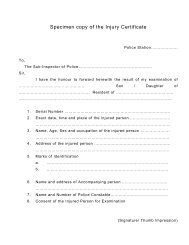
![JAFM-33-2, April-June, 2011 [PDF] - forensic medicine](https://img.yumpu.com/43461356/1/190x245/jafm-33-2-april-june-2011-pdf-forensic-medicine.jpg?quality=85)
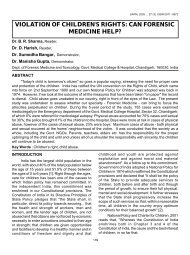
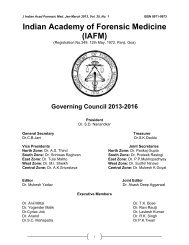
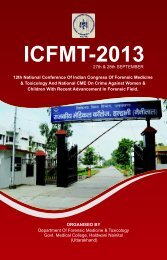
![JIAFM-33-4, October-December, 2011 [PDF] - forensic medicine](https://img.yumpu.com/31013278/1/190x245/jiafm-33-4-october-december-2011-pdf-forensic-medicine.jpg?quality=85)
